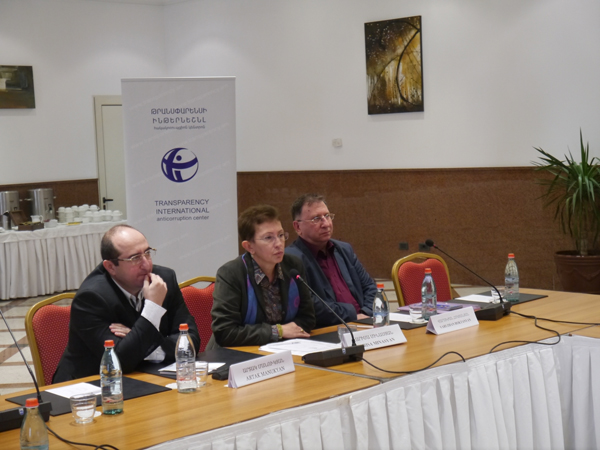October 20th, 2015. The findings of 2014-2015 public procurement system monitoring were presented on October 20, 2015 during an off-the-record discussion, held by Transparency International Anticorruption Center (TIAC). The opening remarks by Larisa Minasyan, Executive Director of Open Society Foundations-Armenia and Varuzhan Hoktanyan, Executive Director of TIAC were followed by presentation of Artak Manukyan, TIAC’s Procurement Policy Expert who briefed the interested representatives of state institutions, foreign embassies, international and non-governmental organizations on the findings and the main conclusions of the survey.
As a logical continuation of monitoring of public procurement system in 2011-2013, TIAC report recorded that despite a number of positive changes in 2014-2015, mainly due to improvement of a number of sub-legislative legal acts (which particularly reflect some recommendations previously made by TIAC), no essential systemic improvements were observed and a number of key recommendations remained unanswered.
The findings of monitoring reveal that a number of provisions and requirements in Public Procurement Law are actually not exercised, in particular
• Ban against simultaneous participation of organizations belonging to or over 50% belonging to the same person in the same procurement process is not controlled
• Reports are not adequately published in the manner prescribed by law
• Requirements on conflict of interest and their declarations prescribed by law are not controlled
• Recurring ambiguity in legislative requirements’ formulation enables the employers to avoid their implementation
The report pays special attention to the activity of complaint system in public procurement. In spite of certain improvements as a result of recommendations made by TIAC (online broadcasting of procurement complaints review meetings that are unprecedented in the world, availability of hotlines, etc.), the report pointed to a number of essential shortcomings. In particular, all decisions on complaints review made by Procurement Complaint Review Board are fully repeated.
The position of Procurement Support Center. Thirty-one out of seventy-two members included in Procurement Complaint Review Board have never been engaged in complaint review processes, whereas Complaint Review Commission includes participants that are not involved in Procurement Complaint Review Board list.
Another important area of monitoring referred to the process of single source procurement. As for single source procurement, TIAC revealed a number of corruption risks related to, for instance, Mikshin and Mikmetal companies. There are numerous single source procurement cases when procurement is conducted with prices higher than market ones. Another marked feature is that some clients give preference to certain participants (companies) and periodically conducting single source procurement with them.
The third area of procurement is the monitoring of framework agreements. The main problems revealed are strict centralization, with further growth intention regarding both clients and winners (when the given client “prefers” to deal with one certain company), no legislative regulation regarding the terms and order of posting framework agreements’ monthly reports on the website, etc.
The report also reviewed a number of other aspects of state procurement system. The publication will be available in early November 2015 in English and in Armenian.


























































